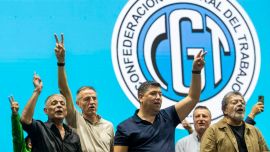THE WEEK IN CORONAVIRUS
The Covid-19 death toll yesterday crossed the grim threshold of 125,000 with a total of 125,062 deaths and 8,815,247 confirmed cases at press time as against 123,859 deaths and 8,716,940 confirmed cases the previous Friday. Last Tuesday Science Minister Daniel Filmus expressed his hope that the first Argentine vaccine would be up and running and ready for export throughout the region by the end of the year. Provincial governments worked to adjust the return of the school year to the current situation.
ALBERTO IN COURT (FOR CFK)
President Alberto Fernández duly took the witness stand on Tuesday morning, denied that he had ever received orders to allocate funds “disproportionately” to Santa Cruz public works while serving as Cabinet chief under the Néstor and Cristina Kirchner presidencies. The president was testifying as a witness for the defence of his Vice-President Cristina Fernández de Kirchner (who turns 69 today) in a corruption trial in response to questions from her lawyer Alberto Beraldi. President Fernández also denied knowing the Kirchnerite tycoon Lázaro Báez, the main beneficiary of Santa Cruz public works contracts, beyond the briefest of introductions in Calafate, or the Kirchnerite financier Ernesto Clarens, further denying any connection between the charges against Báez and the Kirchners. He also insisted that public works funding was “a political decision beyond the courts” and questioned prosecutor Diego Luciani’s powers of understanding when he repeated his questions although he then excused himself if he had sounded “disrespectful.” The trial, which began in May, 2019, is probing corruption in the award of 52 Santa Cruz highway contracts between 2003 and 2015. On Wednesday the Criminal Cassation Court upheld Cristina Kirchner’s trial in the “cuadernos (copybooks)” corruption trial.
TRANSPORT DISPUTE
At the start of the week the government officially allocated 9.6 billion pesos for the first quarter of this year (20 percent more than the previous quarter) to subsidise inland bus transport "in order to maintain its sustainability" while seeking the support of provincial governors to accelerate moves to slash subsidies for 32 bus lines operating purely in the Federal Capital to the tune of 14.6 billion pesos. National and City Hall authorities huddled last Thursday in the first round of this dispute while the Supreme Court summoned both sides to a conciliatory meeting on March 10. Thus far City Mayor Horacio Rodríguez Larreta stands alone with the Radical governors of Jujuy (Gerardo Morales) and Corrientes (Gustavo Valdés) joining eight Peronist northern governors in backing the national government, contrasting the minimum bus fare of 18 pesos in the Buenos Aires Metropolitan Area (AMBA) with the northern average of 50 pesos although Córdoba Peronist Governor Juan Schiaretti would also like to see Greater Buenos Aires sharing the subsidy cuts.
INFLATION
Last month’s inflation was posted as 3.9 percent by the INDEC statistics bureau on Tuesday, projecting an annual inflation of over 50 percent. Steep price increases for perishable foods was a major factor but core inflation (excluding seasonal and regulated prices) was still 3.3 percent.
FLIGHTS HALTED
Air controllers yesterday staged two-hour stoppages which have so far obliged over 100 flights of Aerolíneas Argentinas and other airlines to be rescheduled, affecting over 12,000 passengers. Jonatan Doino, the secretary-general of their ATEPSA union, denied that their action was a strike or that it threatened the Carnival long weekend or that it was only driven by pay issues, complaining about a "collapsed navigation system." Doino also argued that the nation’s 2,500 air controllers would need to be increased by at least 15 percent for the system to function properly.
CORRIENTES ABLAZE
At least 20 forest fires were reported to be still blazing in Corrientes at press time yesterday and rapidly advancing over an area of 600,000 hectares with the situation remaining critical. The Parque Nacional Iberá, a national showcase for flora and fauna, has been badly affected. Meanwhile farmers (blamed by Environment Minister Juan Cabandié for the fires) are reporting losses of around 25 billion pesos.
MARKET WATCH
The “blue” parallel dollar lost ground last week, falling to 211 pesos from 215.50 pesos the previous Friday, dropping three pesos alone yesterday. This was partly due to the Central Bank upping interest rates to 41.5 percent, as well as accelerating devaluation by pushing up the official exchange rate from 110.20 to 112 pesos yesterday, as quoted by Banco Nación, or 185.59 pesos if the 65 percent surcharges for savers are added. The parallel but legal exchange rates of the CCL (contado con liquidación) and MEP (medio electrónico de pagos) continued to move down, the former to 207.58 pesos as against 215.21 pesos the previous Friday while the latter fell below 200 pesos to close at 199.72 pesos as against 207.89 pesos the previous Friday. Country risk also dropped to 1,758 points yesterday as against 1,787 points at the close of last week.
MORE MARCHES
There was a flurry of protest marches downtown throughout the week, especially on Tuesday, reflecting apprehension that there will be no expansion of social plans due to the upcoming agreement with the International Monetary Fund but also more specific grievances such as bakers (complaining about rising costs) and the fired employees of the Garbarino chain of household appliance shops. The picket organisations called for more job creation and soup kitchen assistance.
NEW HEAD FOR COUNCIL OF MAGISTRATES
San Martín federal appeals court judge Alberto Lugones will be the next president of the Council of Magistrates for the next two months at least, promising “to do everything in his power” to bring the body in line with the Supreme Court ruling obliging it to return to its original strength of 20 members by April 16, despite being a harsh critic of that ruling (“Everybody knows what I think of it,” he said). Lugones was elected at a plenary meeting last Thursday morning to replace lawyer Diego Molea, pledging to “guarantee the Independence of judges,” to press for vacant benches to be filled and to place the battle against drug-trafficking on the front-burner.
VENEZUELA
Venezuelan officials on Monday called on the Argentine government to explain Macri’s presumed plans for a military invasion Venezuela in 2019, as revealed in secret documents published the previous day by journalist Horacio Verbitsky in his web portal El Cohete a la Luna, further complaining that the Alberto Fernández government had said nothing on the subject.
MESSAGES FROM WASHINGTON
Following a formal Thursday afternoon meeting with the new United States Ambassador Marc Stanley, Foreign Minister Santiago Cafiero commented that there were many things which needed improving in the bilateral relationship, especially Argentina’s trade gap where he trusted that Washington’s commitment to restoring Argentina to its Generalized System of Preferences would boost exports. Cafiero said that the meeting covered the entire bilateral agenda, "naturally" including the International Monetary Fund (IMF). Stanley’s comment was that "good friends have frequent and direct conversations."
SCHULMAN STEPS DOWN
José Ernesto Schulman on Tuesday resigned as president of the Human Rights League (founded in 1937 by Communist opponents of the military governments of that period) following massive social repudiation of the images of his slapping a Santa Clara bus company employee in anger over the delayed arrival of his holiday transport, a repudiation joined by Grandmothers of Plaza de Mayo leader Estela Barnes de Carlotto among others. Schulman, who had tried to excuse his outburst by referring to his physical handicaps, will be replaced by the League’s vice-president, Iris Pereyra de Avellaneda, the mother of Communist youth activist Floreal Avellaneda, one of the first victims of the military dictatorship taking power after the 1976 coup.
CRISTINA’S FLIGHTS
Vice-President Cristina Fernández de Kirchner’s flights aboard Tango presidential aircraft from Buenos Aires to El Calafate (already questioned during her presidency) cost 18 times more than a first-class ticket with Aerolíneas Argentinas for the same distance, an investigation by Noticias Argentinas news agency has revealed. The planes sometimes fly down empty with the sole aim of picking her up in El Calafate. Her last flight to El Calafate cost 554,413 pesos as against around 30,000 pesos for a first-class Aerolíneas Argentinas ticket.
BROTHERLY TAPES
The Supreme Court on Thursday unanimously suspended the ruling obliging the journalist Santiago O’Donnell to hand over his tapes to Mariano Macri (brother of ex-president Mauricio Macri) on the grounds that this would be a violation of his professional secrecy. O'Donnell (author of the book Hermano, giving the often critical opinions of Mariano Macri regarding his presidential brother) expressed his relief, "thanking the Court for having taken up such an important issue for the freedom of expression and the defence of press sources." Last February judge Andrea Imatz had ruled in favour of Mariano Macri’s demand that O’Donnell hand over the tapes prior to a lawsuit for damages.
POPE TAPS ARGENTINE
Pope Francis has named the Argentine theologian Emilce Cuda, 56, to head the Pontifical Commission for Latin America, alongside Mexican professor Rodrigo Guerra López, the Vatican announced yesterday. Cuda’s appointment was seen as a move towards enhancing the role of women within the Catholic Church.
KUN VERSUS TAXATION
Sergio 'Kun' Agüero, the recently retired international footballer, last Tuesday criticised assets taxation as "crazy" since it overlaps with income tax, to which he had no objections. Juntos por el Cambio Ricardo López Murphy, a former Economy minister, described Agüero’s logic as “impeccable,” adding: “The state must stop looting tax-payers as the only way possible for more investment, more production and more growth” while libertarian deputy Ramiro Marra also applauded, saying: “The state seems to punish those who work and succeed.”























Comments